There are concerns over the security of schools in Nigeria following a spate of attacks by terrorists and bandits in different parts of the country. Reports indicate that over 60,000 schools in Nigeria are vulnerable to attacks, with the safety of students and teachers at risk. This is a worrying trend that needs urgent attention from the government, security agencies, and all stakeholders involved in the education sector.
The recent attacks on schools in Nigeria have led to the loss of lives, injuries, and the abduction of hundreds of school children. These incidents have left many families traumatised and in despair, as the safety of their children is no longer guaranteed. The government must take immediate steps to address the security challenges in the country and ensure that schools are safe places for learning.
According to reports, no fewer than 1,591 schoolchildren and 61 corps members had been kidnapped in Nigeria since 2014 when terrorists first abducted 276 students from Chibok in Borno State.
While most of the kidnapped victims have regained their freedom unhurt, some are still in captivity, like Leah Sharibu who was taken away in the Dapchi Secondary School mass kidnapping in Yobe State; one student from Bethel Baptist High School, Kaduna; students in Damishi town of Chikun local government area, Kaduna, and three of the eight corps members recently kidnapped on a highway in Zamfara State, among others. In fact, some of the Chibok girls are yet to be liberated from their captors.
The current vulnerability of our schools to attacks has equally raised questions on the level of implementation of the federal government’s Safe School Initiative since its inception in 2019 when former President Muhammadu Buhari signed its Declaration Ratification Document.
The Safe School Initiative, a collaboration among Nigeria, the United Nations and global education advocates, seeks to create an environment where students can learn and grow without fear.
The Initiative is largely implemented by the Nigeria Security and Civil Defence Corps (NSCDC), had covered 21,000 schools of the 80,000 identified as vulnerable to attacks by bandits, terrorists and kidnappers.
Even though the figure of the schools yet to be covered is high, NSCDC, the driver of the programme, has assured Nigerians that it is fully committed to ending the frequent attacks on schools and kidnapping of school children in the country.
The federal government in 2021 expanded the role of the NSCDC to include the deployment of personnel to protect schools and educational facilities, following persistent attacks by bandits and insurgents.
One of the key issues that need to be addressed is the lack of adequate security measures in schools. Many schools in Nigeria lack perimeter fencing, CCTV cameras, and security personnel to protect the students and staff. This makes them easy targets for terrorists and bandits who are able to gain access to the schools and carry out their nefarious activities.
The government must prioritise the training and equipping of security personnel to handle security threats in schools. The police and other security agencies must be adequately trained to respond to emergencies in schools promptly. This will help to contain the situation and prevent further loss of lives and property.
The government should also consider investing in technology to improve security in schools. This could include the use of drones, GPS trackers, and other technological solutions that can help to monitor and track criminal activities in and around schools. This will provide real-time information to security agencies, enabling them to respond quickly to security threats.
In addition, there is a need for increased collaboration between the government, security agencies, and all stakeholders involved in the education sector. This will help to create a coordinated approach to addressing security challenges in schools. All hands must be on deck to ensure the safety of our children and secure the future of our nation.
The security of schools in Nigeria is a matter of utmost concern that requires urgent attention from the government and all stakeholders. The government must take decisive action to secure schools and protect the lives of our children and teachers. We must not allow terrorists and bandits to rob our children of their right to education and a bright future. The time to act is now.





